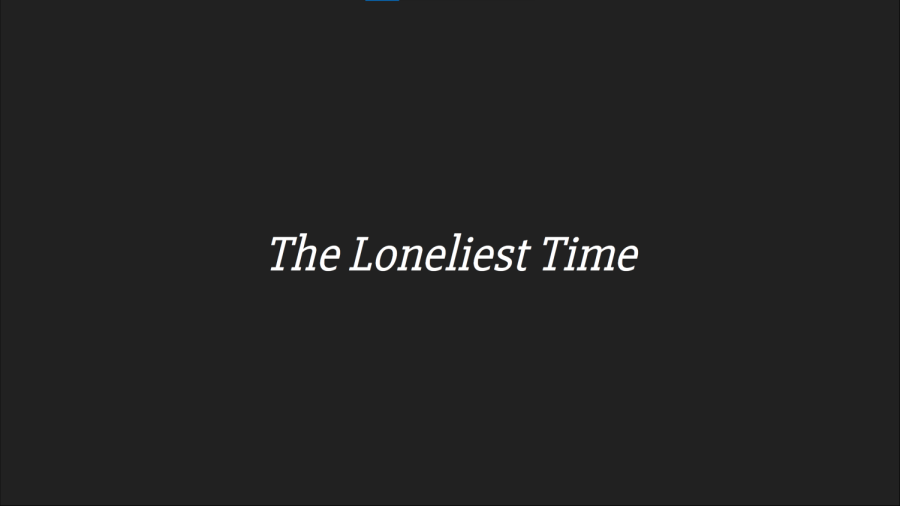The Loneliest Time
Sophomores Turner Edwards and Serina Yan share their thoughts on The Loneliest Time.
In her new album The Loneliest Time, Carly Rae Jepsen unveils a collection of pop songs that are paradoxically both diverse and sonically cohesive.
Jepsen’s objective on The Loneliest Time is clear: after a rough end to her previous relationship, she wants to open herself up to the rest of the world. She declares this goal from the very first song, “Surrender My Heart.”
“I wanna be open, I wanna be honest with you,” she sings, backed by hard-hitting synths. The chorus of “Surrender My Heart” is the excellent payoff to confessions of internal turmoil. The Loneliest Time represents Jepsen’s journey to emotional honesty.
Production is one of the album’s consistently strong points. The Loneliest Time, just like any Jepsen album since Emotion, sounds crisp. Jepsen once again excels at borrowing styles from the past while maintaining a modern vision. Her vocals are clear. Every song is mixed to absolute perfection. The Notorious CRJ is clearly a perfectionist.
“Talking To Yourself” is a definite highlight. Fast-paced and energetic, the breakup anthem is arguably the catchiest song on the album. Jepsen’s bubbly vocals are accentuated by heavy percussion and glossy synths, and it is nearly impossible to not nod your head or tap your feet to the beat. Lyrically, Jepsen addresses a hung up ex (“Are you thinkin’ of me when you’re with somebody else?/Do you talk to me when you’re talkin’ to yourself?”); on ‘’Talking To Yourself,” Jepsen is at her most confident and self-assured.
On “Sideways,” Jepsen is on cloud nine over a bubbling, humming instrumental. Nothing can bother her because, as she puts it, she’s “got plans tonight.” Even when she is inconvenienced, Jepsen is unbothered. Her euphoria permeates both the lyrics and the production. As long as she is happy in her relationship, everything goes her way.
“Bends” is an unfortunate weak point on the album. While promising at first, the song does not find its footing. Although it is only three minutes and 15 seconds long, it feels longer; Jepsen fails to inject the pleasant and laid-back instrumental with any sense of meaning.
“So Nice” is a return to the cloud nine state of “Sideways,” with more of an emphasis on Jepsen’s partner. The song, in its concluding moments, brings in just a touch of piano; this small flourish, which contrasts the track’s general bass and electric guitar, makes the song sound much more personal and intimate. With “So Nice,” Jepsen takes a step in fulfilling her goal set in “Surrender My Heart.”
“Go Find Yourself Or Whatever,” a long but fulfilling ballad, is a significantly more successful version of what “Bends” was supposed to capture. A slow, acoustic instrumental accompanies some of Jepsen’s most vulnerable and open lyrics (“and I wake up alone, you made me vulnerable/so go find yourself or whatever/I hope it treats you better than I could do/and I’ll wait for you”). “Go Find Yourself Or Whatever” breaks Jepsen’s usual conventions, but she does not shy away from a challenge.
The title track and closer to the album (“The Loneliest Time”) is absolutely sublime. In a stunning, ‘70s-injected duet with Rufus Wainwright (of “Hallelujah” fame), Jepsen takes a shot at a disco banger, starting slowly but picking up steam rapidly. Wainwright is a stellar addition to the song—he and Jepsen complement each other perfectly.
The bridge of the song (“I’m coming back for you!”) makes it even more fun; there is just a universal appeal to “The Loneliest Time” that only artists like Jepsen can capture. The title track is the best song on the album. In the gorgeous, string-backed outro, Jepsen and Wainwright harmonize, asking each other a single question: “Is this Nirvana?” The answer is clear.
Final score: 9/10

Turner Edwards ('25) joined The Review in 2021 as a freshman. He has two siblings and he likes to play and watch tennis.

Serina Yan ('25) joined The Review in 2021 as a freshman. Her favorite TV show is "Parks and Recreation" (but only seasons 3 to 7), and her favorite type...

Ella Piper Claffy ('24) joined The Review in 2020 as a freshman. She frequently draws anatomically accurate whales and has a special affinity for the...



